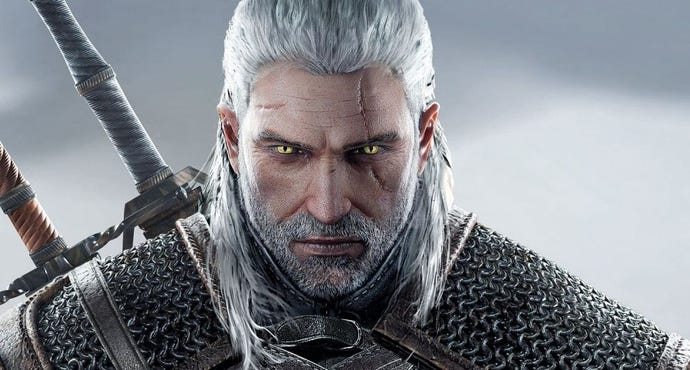What The Witcher 3 tells us about Putin's WW2 dispute
The Witcher 3 might be fantasy, but it’s no escape from the real world.
As the game begins, Velen has been churned up by two armies: the forces of the Northern Kingdoms, and those of the Nilfgaardian Empire, who have fought each other to a standstill. Velen’s former state, Temeria, has ceased to be. The country isn’t governed so much as victimised: the man who occupies the castle on the hill calls himself the Bloody Baron, and is just another bandit preying on an unprotected people.
The parallels to wartime Poland are poignant in the extreme. In August 1939, the Nazis and the Soviet Union signed a non-aggression pact. But a secret clause saw the two powers agree to split Eastern Europe between them. In the following month, their armies invaded Poland, each taking authority over a separate “sphere of influence”, side by side. Two armies churned up the country.
The Nazis intended Poland as ‘living space’ for ethnic Germans, with the population to be deported or exterminated. Stalin, meanwhile, had long targeted Poland as a territory, and took advantage of local belief that the Soviets had arrived as allies. In reality, both powers set out to destroy Polish culture and oversaw brutal regimes during the war.
That might be shocking to hear for the many who have received a historical education through video games. The likes of Medal of Honor and Call of Duty tend to depict the defence of Stalingrad, or the Red Army rolling into Berlin - events which unambiguously show the Soviet Union’s part in breaking the Nazi stranglehold on Europe. But the Polish remember a different story, and the evidence can be seen throughout the deeply sad Velen segment of The Witcher 3.
There are no leaves hanging from the tree that overlooks the village of Mulbrydale - only the dead. While some are deserters, many are villagers and travellers. One is the Oxenfurt scholar Aldert Geert, who had taken to “writing history where it is made, on the front lines of conflict”. It’s the civilian populace who bear the brunt of the suffering in Velen, and so it was in Poland: around six million citizens died there during the Second World War, almost overwhelmingly in non-military settings.
The Soviets confiscated and redistributed all privately owned property, deporting hundreds of thousands of people, many of whom ultimately died. The Nazis systematically killed Poles and Jews in a plan that had “all the characteristics of genocide,” according to the International Military Tribunal at the Nuremberg Trials.
There was no leadership left to defend Poland during these years; the local government had been pushed into exile, and both occupiers targeted political and intellectual elites to discourage resistance. Churches, too, were persecuted by both regimes.
The Soviet Union endorsed state atheism, and so opposed all organised religion. Meanwhile, in the large areas of western Poland annexed by Germany, the Nazis arrested church leaders, closed monasteries and convents, and sent clergymen and nuns to labour or concentration camps.
It’s a history that lends real weight to Velen’s godlessness. The country once had a goddess, we’re told, but she slowly went mad. Her daughters murdered and buried her beneath the Whispering Hillock. All over Velen, you meet people grasping for anything resembling a higher power. You find one stand-in deity hiding in a cellar - a selfish sylvan getting fat on the alms of peasants. And then there are the witches, who might deign to consider using their powers for good if they’re offered an ear. Literally.
It’s not that the people of Velen are stupid or superstitious. It’s that, stateless and devoid of divine protection, they have nowhere better to turn.
“The gods have abandoned us,” they write in a book Geralt finds. “The mighty of this earth care not for our fate. Only the Ladies of the Wood watch over Velen. In foul times, when plague and famine reap their harvest, we must beg the Ladies for help.”
The Polish couldn’t be picky either. Even after the occupation, they turned to the Soviet Union for assistance. In 1944, with the Nazis in retreat, the Polish resistance in Warsaw rose up. The aim was to recapture the capital as the Allies pushed back across Europe, and it would have worked, had the Red Army continued its advance. Instead the Soviets halted outside city limits, ignored Polish attempts to make radio contact and allowed the Nazis to rally. By the time Warsaw was liberated the following year, the Polish resistance was crushed and the city mostly destroyed. It was a final, cruel twist in the Second World War story of a land trampled underfoot by foreign powers.
Today, this history is disputed. European Parliament passed a resolution in September casting blame on both Nazi Germany and the Soviet Union for starting the Second World War with Poland’s invasion. But Vladimir Putin told press before Christmas that this interpretation was “totally unacceptable and inaccurate”. In recent years, the Russian leader has worked to rehabilitate Stalin’s image as a wartime hero, in an effort to legitimise his own authoritarian leanings.
In this context, the Polish prime minister Mateusz Morawiecki has argued that it’s more important than ever to tell the stories of wartime Poland.
“Today, when some want to trample the memory of these events in the name of their political goals, Poland must stand up for the truth,” he wrote. “Not for its own interest, but for the sake of what Europe means.” In its own oblique way, The Witcher 3 does just that.





